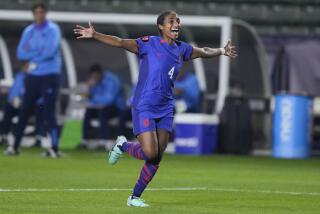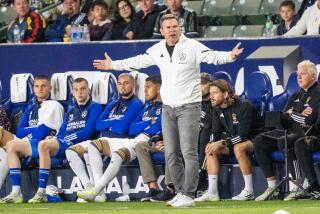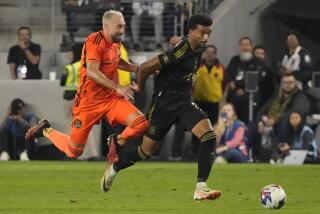U.S. World Cup team seems built for the future
A day after arriving at the U.S. team’s World Cup training camp last month, goalkeeper Tim Howard was asked what he thought of Landon Donovan’s play.
“For me it’s a very easy equation,” he said. “If Landon’s on the field he’s among our top one or two players.”
But Donovan won’t be on the field Monday when the U.S. plays its World Cup opener. Three days after Howard’s comment, Donovan was cut from the roster, making this game the first World Cup match the U.S. will play without him in 16 years.
Donovan’s absence is a sign the U.S. isn’t playing for today as much as it’s playing for the next World Cup in 2018, and beyond. It’s a team built not for the present but with an eye toward the future.
U.S. Coach Juergen Klinsmann has denied this is his plan, while at the same time saying “winning the World Cup is just not realistic” right now. His new four-year contract gives him the time to chart a course for the national program, one he believes will eventually make the U.S. the kind of world power he played with and coached for in Germany.
This direction leaves little room for sentiment. So Donovan, the national team’s all-time leading scorer and arguably the best player in U.S. history, is jettisoned at 32 and unproven teenager Julian Green is added.
Eddie Johnson, whose four goals got the U.S. through World Cup qualifying, is cut and so is Clarence Goodson, the only defender with World Cup experience at that position. Added are John Brooks and Timothy Chandler, two young but little-used German-born players with U.S. passports, and DeAndre Yedlin, a 20-year-old from Seattle.
In Klinsmann’s view, his success won’t be judged on one or two World Cups. It will be in the direction he takes U.S. Soccer, one reason why his contract made him technical director for the entire national program. In that role he can set priorities for the youth academies and age-group teams, including the under-18 national team on which his son Jonathan is a goalkeeper.
“I have to do what I believe is the right thing,” he said. “And time will tell. … I’m very strongly convinced this is the right way to go, this is the right decision that we made. And I believe in that.”
On and off the field Klinsmann, six weeks shy of his 50th birthday, is a high-energy, perpetual-motion machine who looks as fit now as he did when he was scoring three goals to lead West Germany to the World Cup title in 1990. He often runs stadium stairs before training and sometimes plays intense pick-up games with his coaches. He speaks five languages, coached the German national team to the World Cup semifinals in 2006 and, after years of battling Southern California traffic, got a helicopter pilot’s license so he could fly 30 miles from his Newport Beach home to training camp in Carson.
It’s a complete resume, one that speaks to Klinsmann’s belief that resting on past accomplishments hurts future possibilities. Over the last four months, Klinsmann has clearly broken with the past in some ways and embraced it in others.
While demanding loyalty of his players and staff, Klinsmann showed little of that in April when he pushed aside longtime assistant and confidant Martin Vasquez and added former German player and coach Berti Vogts as a special assistant.
What remains is a mix of young, inexperienced players and some world-class veteran talent. Captain Clint Dempsey has scored in the last two World Cups, while Howard, on his third U.S. World Cup team, has established himself as one of soccer’s top goalkeepers during an eight-year career with Everton of the English Premier League.
Midfielder Michael Bradley, 26, has already played on teams in six countries and has emerged as the blue-collar heart and soul of Klinsmann’s squad.
The road the U.S. is being asked to follow may be the toughest in what is arguably the deepest World Cup field in history. The Americans open Monday against Ghana, the team that knocked them out of the last two World Cups. They follow that with a game against Portugal and Cristiano Ronaldo, the reigning world player of the year, in the heat and humidity of the Amazon, before finishing group play with Germany, ranked second in the world.
The U.S. probably needs a win and a tie out of those three games to advance from group play, but will have to travel 9,000 miles in less than two weeks to do that.
Klinsmann has said the tournament would be a success if the team survives the first round, which it has in three of the last five World Cups. Yet in doing that, the U.S. has won only four World Cup games in the last two decades.
The German team Klinsmann coached in 2006 won more games than that in just 18 days.
Klinsmann’s success with the U.S. national program may hinge on his ability to blend the European and American aspects of his personality with that of his team.
The son of a baker from Stuttgart, Klinsmann, the team’s first non-U.S. coach since 1995, believes in structure, unwavering dedication to soccer and an esprit de corps in which personal desires are sacrificed for team goals. He hopes to have found that in a roster that includes seven Europeans — five from Germany — and a technical staff that has two former German coaches.
After marrying a model from Huntington Beach and moving to Orange County 15 years ago, Klinsmann has embraced the laid-back Southern California lifestyle, dressing in blue jeans and sneakers and peppering his conversations with words like “cool” and “awesome.”
He can, however, be rigid and uncompromising one day and unpredictable and equivocal the next, creating an atmosphere of chaos around the team.
One thing that isn’t inconsistent is his commitment to remaking U.S. Soccer, a task that will remain incomplete no matter what happens at this World Cup.
“We, every year, are making another step forward. We are getting stronger,” he said. “We now always approach games where we say we don’t look at ourselves as an underdog.
“At the end of the day with soccer, the beautiful thing is it’s unpredictable; you don’t know what happens. Every game is another step towards the next, bigger job…. We aren’t shying away from anybody.”







